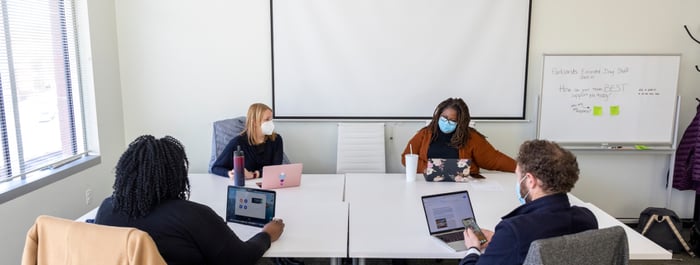Fifteen months ago, I uprooted my family, returning to my hometown of Washington, DC to build my professional identity as an education consultant. One week later, on November 8th, 2016, our country entered a “new normal” and what began as a necessary mindset shift soon became a deep reflection about my role in the greater education reform community.
I’m driven to help make our schools more efficient on behalf of students — in particular, students with disabilities, students involved in the juvenile justice system, and other disconnected youth. These young people are gifted with exceptional talents – some seamlessly mask their inability to read as fluently as other students; others use their creativity to build intricate extracurricular opportunities; and most overcome tremendous adversity just to show up. They need our help to channel those talents in a productive way. I’m determined to do my part to ensure that we continue to take action on behalf of this important population.
We must remain vigilant to what is happening in our communities. For example, in December, while educators were counting down to much-earned holiday breaks, the U.S. Department of Education (“ED”) took two steps that could have important implications for our country’s students — in particular, those with disabilities — and yet both went below the radar. With more than 6.6 million students with disabilities attending public schools across the country (representing 13% of all students), we cannot continue to let these actions slip by.
First, on December 7, ED issued a question and answer document (“FAQs”) reviewing the Spring 2017 Supreme Court decision that clarified a school’s legal requirements for delivering a free and appropriate public education (“FAPE”) under the Individuals in Education Improvement Act (“IDEA” or “IDEIA”). In order to deliver FAPE, the Court reiterated that a school must offer a program reasonably calculated to enable a child to make progress appropriate in light of the child’s circumstances and every child must have the chance to “meet challenging objectives.”
ED’s FAQs restate that it is no longer sufficient for schools to rewrite the same Individualized Education Program (“IEP”) for a student year after year and let students stagnate. Schools must offer meaningful opportunities to make appropriate academic and functional advancement, and IEP teams (including parents) must carefully consider an individual child’s potential for growth. The IEP team must use its collective experience to (1) understand how the child’s disability affects her progress in the general education program and (2) offer each student a program to meet challenging standards and ambitious goals. The Court’s decision and ED’s FAQs reinforce that the bar should be higher than many schools and districts are currently delivering for students with disabilities.
While the FAQs underscore putting more resources into getting special education right, in a separate move, ED seemed to do the opposite by seeking to postpone the implementation of regulations addressing racial bias and disproportionality in special education. Leaving IDEA’s requirement to reduce disproportionality unregulated will only further institutionalize discrimination in our schools. Without federal accountability, our schools will continue to impose inequitable practices that leave students of color behind.
Rest assured, there are bright spots in special education pedagogy – curriculum and programming that truly individualizes instruction, innovative technology that adjusts to student competencies, a more nuanced understanding of the neuroscience behind disability – but without appropriate systems reforms, that innovation will land on deaf ears. We must create systems that truly meet the needs of all students, especially students with disabilities and students who are hardest to serve. Schools are resource-strapped and students with disabilities often require a disproportionate share of these resources. Still, by spending the time up front to create and implement effective systems, schools can ensure they are both compliant and student-centered, create a sustainable environment, and free up resources to focus more directly on serving children.
Why systems reform? Effective systems enable schools to offer training and capacity building so staff members are able to differentiate between a student who needs a specific intervention, one who needs remediation to bridge a skills gap, and one who needs a referral for a special education evaluation. Solid infrastructure will prioritize planning between psychologists, special education and general education teachers, and related service providers to deep dive into each student’s disability and to adequately create a blueprint that will address those unique needs. And robust processes will help schools build a true continuum of services that meet the needs of students with needs as varied as dyslexia and ADHD to autism and hearing loss. This isn’t just what the law requires — it’s our moral imperative to our students.
We are failing and must do better for all of our children, and I’m eager to begin 2018 by pushing educators and advocates to find what works for students. We can get to a place where every student — especially those with disabilities and other specific learning needs — attends a high-quality school that meets their academic and socio-emotional needs. Where every student leaves school prepared for a successful career and fulfilling life.
My call to action: develop a plan for working with schools in achieving systems excellence. I hope you’ll join me. Our country and our students deserve it.
About the Author
Sarah Sandelius has nearly 15 years of experience driving operational policy and strategy on behalf of our nation’s young people, focusing on the most vulnerable populations — disconnected youth, justice-involved students, and students with disabilities. She is the Founder of FlipTurn Education Consulting, an independent education consulting firm working with schools to connect the dots between policy, process, operations, and performance, and is launching an initiative focused on school-based systems reforms for special education students and other special populations.
© Photo Credit – Rebecca Drobis – Education Photographer – rebeccadrobis.com




